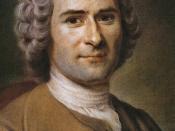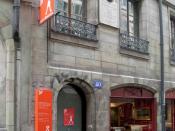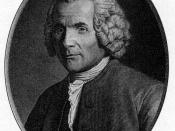Jean-Jacques Rousseau was born on June 28, 1712 in Geneva, Switzerland. His mother died shortly after his birth (Chew). When Rousseau was ten, his father fled from Geneva to avoid imprisonment for a minor offense, leaving young Jean-Jacques to be raised by an aunt and uncle. Rousseau left Geneva at 16, wandering from place to place, finally moving to Paris in 1742. He earned his living during this period, doing jobs like being a footman to assistant to an ambassador (Chew). Rousseau died on July 2, 1778 in Ermenonville, France. 18th century Swiss philosopher Jean-Jacques Rousseau taught parents to think differently about their children and their education, he theorized that men were created equal and called it the state of nature, and argued that the advancement of science and art had not been beneficial to mankind.
Jean-Jacques Rousseau taught parents to think differently about their children and their education. Rousseau believed that children should not learn by modern ways of teaching, but rather from their parents with their father being most important.
"Since the beginning of time there has been a continual outcry against the established practice without anyone suggesting how to propose a better one" (Rousseau 9). Observing nature and learning from it was also one of Rousseau's focal points, saying "Life is not just breathing: It is action, the functioning of organs, senses, faculties, every part of us that gives the consciousness of existence" (Rousseau 17). Rousseau suggested that there are two options when educating a child, both of which are important to the child's future. "We must chose between making a man and making a citizen. We cannot make both" (Rousseau 9). In the opening section of Emile, Rousseau suggested a natural education, the aim of which is to make the human as he is. He does...


